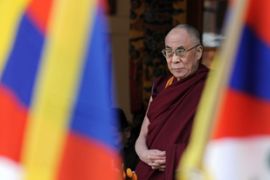China ‘must approve’ new Dalai Lama
Beijing warns it will not recognise reincaration that does not have its endorsement.

| In video: Tibet |
|
|
“If the Dalai Lama does not follow the convention for political or other purposes, I believe his reincarnation would not be acknowledged by religious people in Tibet, and the central government will never approve it,” he said.
The current Dalai Lama, who is revered as a living god by his followers, has lived in exile in India since he fled Tibet half a century ago following a failed uprising against Chinese rule.
But as he ages and his health declines, his succession has become an increasingly sensitive issue.
According to the Chinese government, the Tibetan leader’s reincarnation must be chosen by drawing lots from a gold urn given to Tibetans by the ethnic Manchu emperors of the Qing dynasty.
It says that under a 1793 imperial ordinance only the central government can exempt a potential Dalai Lama from the ritual.
Leadership vacuum
The Dalai Lama has previously said his successor may be found outside China, or even that Tibetans themselves could order a vote on whether to continue an institution that has given one monk both spiritual and political influence over Tibet.
He has also hinted he may resign the position, meaning that the next “reincarnation” of the Dalai Lama may be chosen before the death of the current one.
Traditionally the Dalai Lama’s successor is a boy born after his predecessor’s death and chosen by Buddhist monks.
Many Tibetans fear that the death or departure of the current Dalai Lama may create a leadership vacuum that Beijing could exploit to tighten its grip over the Himalayan region.
Others fear the loss of their most widely-recognised leader could weaken the unity of the Tibetan movement, and potentially trigger widespread unrest in ethnic Tibetan regions across China.

 Tibet’s Chinese future
Tibet’s Chinese future